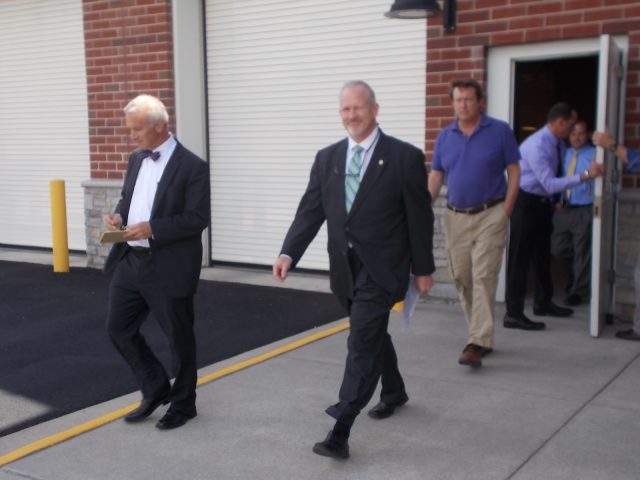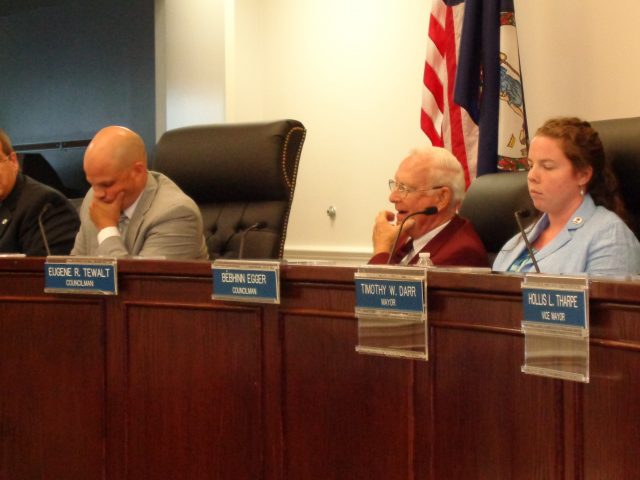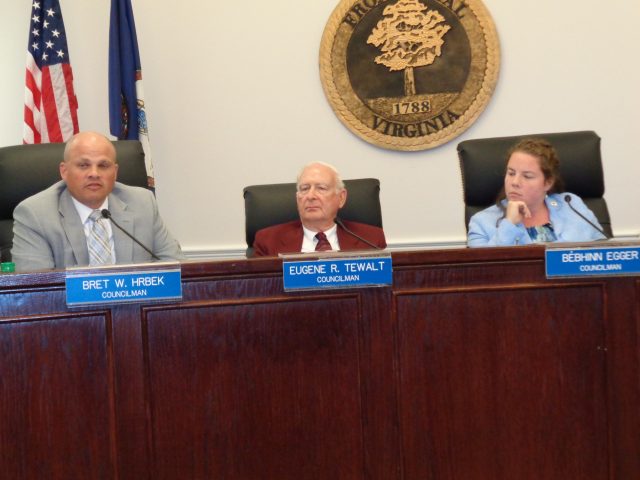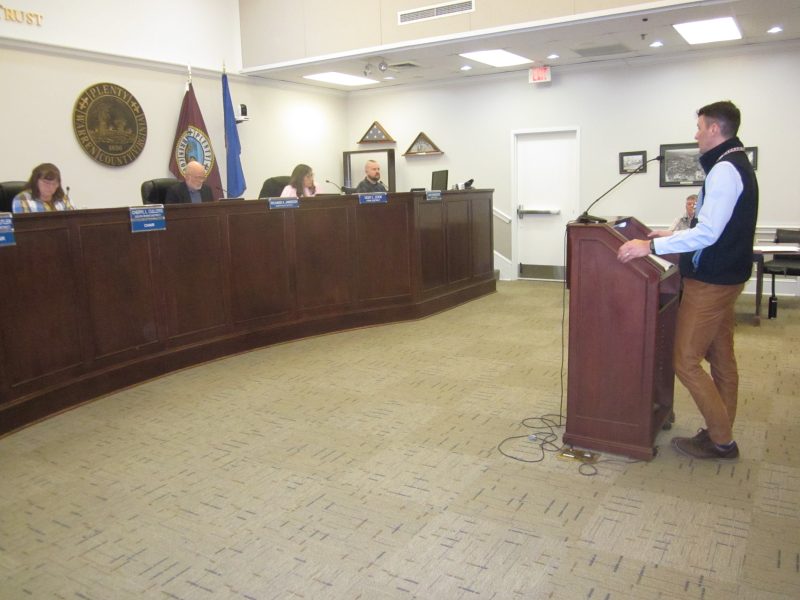EDA in Focus
Op-Ed: County, EDA officials cited for failed oversight – why not the Town?

The status of the ITFederal project and the $10 million loan that facilitated it is likely to be under increasing scrutiny by EDA civil attorneys contending that loan was acquired under false pretenses. Royal Examiner File Photos/Roger Bianchini
Many have wondered when or even if prosecutors and state investigators guiding the Warren County Special Grand Jury’s look into criminality tied to the Economic Development Authority financial fraud investigation would expand its focus beyond a tightly knit circle surrounding former EDA Executive Director Jennifer McDonald.
On Tuesday, September 24, they got an answer, if not precisely the one many citizens critical of the political and economic status quo here were hoping for.
That answer was a total of 42 indictments, three each against 14 new players, including the entire elected Warren County Board of Supervisors, the top county administrative official and recently departed County and EDA attorney, as well as a mix of former and sitting EDA Board of Director members.
The disappointment for some was that those indictments were all misdemeanor charges related to an absence of due diligent oversight of EDA affairs, specifically over the last four months of 2018 regarding the continued administrative authority of Jennifer McDonald. (See linked story below)
The bookings at the Magistrate’s Office of the Rappahannock-Shenandoah-Warren County Regional Jail (RSW Jail) didn’t even generate the orange jail jumpsuit mug shots many social media denizens would have likely framed for posterity.

No mug shots today – County and EDA officials charged with misdemeanor failures of due diligence in the conduct of their office were not booked into the jail, as any defendant in similar circumstances released on their own recognizance would not be RSW Superintendent Gilkison has explained.
But while County officials rightfully face scrutiny for their failed due diligence, the Town of Front Royal governmental apparatus has thus far escaped unscathed, at least regarding criminal liability and even the level of public criticism aimed its way.
No Front Royal Town official has yet been indicted for criminal negligence regarding financial oversight of EDA operations; and to our knowledge there is no “recall them all” petition being circulated against the Town Council.
Why?
Three years ago, it was an overwhelming majority of Council that threw a defensive and protective shield around both McDonald and two of the more implausible projects she was instrumental in bringing forward.

This mid-2016 photo perhaps shows varying levels of disinterest expressed by all of Bébhinn Egger’s Town Council colleagues over her claims about ITFederal at the time.
In fact, those two projects, ITFederal and Workforce Housing, account for nearly $11 million, $10 million and $650,000 respectively, of the $21 million in EDA assets alleged to have been either misdirected by McDonald or moved under false pretenses during her executive oversight.
But some Town officials have claimed Front Royal has nothing to do with EDA operations since the County took over the Town’s portion of the EDA’s annual operational funding in 2012.
But as Royal Examiner has reported previously, that notion is questionable at best with much of the EDA’s work being done on behalf of the Town on projects inside the town limits. ITFederal, Workforce Housing, the Afton Inn and new police headquarters construction project come to mind.
If that wasn’t the case how do Town officials explain filing suit against the EDA to recover as much as $15 million in Town assets they contend were misdirected, lost or acquired under false pretenses? Do they think McDonald snuck into a secret town vault to pick the lock or hacked into Town bank accounts and sent their $15 million to a secret offshore location?
No, if experience tells us anything chances are that if McDonald had asked the Town Council for $15 million they would have just given it to her with a pat on the back.
In fact, that’s exactly what Council did in 2015 when McDonald came and asked for a $10 million “bridge” loan to help prop up the EDA’s case with First Bank & Trust to finance a $10 million loan to ITFederal through the EDA. Council was even kind enough to extend that initial one-month loan taken out of an investment account generating nearly $4,000 of monthly interest for two additional months without fee compensation for lost interest revenue beyond the first month.
It seems very possible that without that three-month Town handover of the desired ITFederal loan amount the bank loan for ITFederal would never have been achieved, reducing the EDA’s claimed losses by almost half.
But when Councilwoman Bébhinn Egger warned her colleagues that ITFederal did not appear to be what it was purported to be financially or from a business standpoint by McDonald, Congressman Robert Goodlatte and the company’s CEO Truc “Curt” Tran the reaction was not one of cautious due diligent verification.
Rather, the unanimous consensus of Egger’s colleagues was to either ignore or berate her, not to mention your then newly created online news source, for telling them things they didn’t want to hear – even if as it turned out, they were verifiably true at the time – as in no $140 million government contract basis upon which to create 600 high paying tech industry jobs as part of a $40 million ITFederal investment in this community.

From left on Nov. 28, 2016, Councilmen John Connolly, Hollis Tharpe, Bébhinn Egger, Gene Tewalt, Bret Hrbek, Mayor Tim Darr, and Jacob Meza at far right, bid farewell to Town Manager Steve Burke, second from right. Only one of this group, you know who she is, performed due diligent oversight of EDA affairs. It was a majority state of affairs that lasted on council for another year and a half.
Revisionist History?
The day after the County and EDA misfeasance and nonfeasance misdemeanor bookings the Town of Front Royal issued a pat-us-on-the-back press release in which Interim Mayor Matt Tederick lauded the town government’s role in launching the Virginia State Police investigation into EDA finances.
“Due to the watchful eyes of the Town Government, potential financial irregularities involving the EDA were discovered in the late spring and early summer of 2018. The Town Council swiftly turned their findings and suspicions over to the Virginia State Police, who in turn immediately commenced an investigation,” Tederick states, adding, “The citizens need to rest assured that the Front Royal Town Council will continue to pursue its lawsuit against the EDA and any others in order to hold those responsible for the Town’s losses accountable. The public’s continuing confidence in Town government is greatly appreciated and I might add, warranted.”

Pals – then EDA Executive Director Jennifer McDonald and private citizen Matt Tederick pose before start of Sept. 25, 2017 Town Council meeting. It was a meeting at which Council voted against a Board of Architectural Review recommendation to deny the EDA request to allow demolition of the Afton Inn to facilitate redevelopment at the site.
As far as ascertaining responsibility for any Town losses, both current and past councilmen and mayors over the past five years might begin by looking in the mirror.
As for “continued confidence”, as mentioned near the end of our story on a Council initiative to explore creation of its own EDA, if Tederick is referencing the work of town staff, as opposed to all but one of its elected officials (Egger) in recent years, he may be on to something.
After all, in June 2017 Town Police investigators began to develop suspicions that some reported criminal actions targeting the EDA offices and its then executive director had been staged from the inside.
And about a year later Town Finance Director B. J. Wilson did discover an eight-year history of over $291,000 in Town debt service overpayments to the EDA that finally set the process of EDA financial scrutiny in motion.
But that scrutiny was a long time coming, about 2-1/2 years after council was warned by one of its own that things appeared horribly amiss in some EDA projects. And the scrutiny of 2018 did not generate from any Town Council initiative targeting the EDA, but as noted above from staff discoveries while exploring Town finances that landed a “smoking gun” of precise evidence on Council’s lap.
It was Wilson, Town-contracted auditors and the Town Attorney who took the point in confronting McDonald, EDA Board Chairman Greg Drescher and EDA Attorney Dan Whitten over those debt service overpayments of nearly $300,000 on August 23, 2018. It was at that meeting during which the term “fraud” may have been first broached regarding EDA finances.

Greg Drescher and Jennifer McDonald appeared grumpy at times under questioning by Tom Sayre and Archie Fox at June 2017 joint work session on the EDA’s Workforce Housing Project.
That mid-2018 meeting between Town and EDA officials led to Drescher’s resignation as EDA board chairman the following day. It was also likely a driving factor in the County’s hiring, on behalf of the EDA, an investigative public accounting firm, Cherry Bekaert, to begin a probe into irregularities within EDA finances.
It was also a meeting that, as Tederick observed, led to the launching of a State Police investigation. But by that point, not to forward staff’s information on EDA financial irregularities to law enforcement for scrutiny might have eventually been seen as indictable as a more serious felony charge of complicity in a cover up of financial fraud.
As for that State Police investigation, one might contend it was begun a year earlier by the Front Royal Town Police. But that investigation was allowed to be shut down in 2017 at the request of EDA Board Chairman Drescher to allow, first the EDA board, then its executive director to control the investigation of alleged crimes targeting the EDA and its chief executive through a hired private investigator.
It was a request and decision that allowed the alleged EDA financial subterfuge, whatever its source, to go unchecked for an additional year and a half.
Accountability – where?
But beyond an honest self appraisal of its past complicity in throwing a protective shield up against scrutiny of EDA projects and its executive director’s assertions about them, should town officials be vigilant about past EDA activities that may have targeted more of its assets versus those of the County? – Certainly.
But why not continue the joint reform process the interim mayor and council propelled forward, rather than just withdraw from it? After all, new EDA Executive Director Doug Parsons has promised full cooperation in determining an accurate appraisal of the Town’s losses within those EDA losses financial fraud investigators have reported being misdirected through EDA operations over a number of years.
And we would suggest the interim mayor and council not continue a course of self-delusional praise and finger-pointing that tries to minimize the Town Council’s own long-term lapsed due diligence regarding EDA affairs it was directly involved in facilitating.

In mid-2016 Bret Hrbek, left, was Jennifer McDonald’s staunchest defender among many, when Bébhinn Egger, right, raised concerns about assertions about EDA projects, particularly ITFederal.
And speaking of that involvement, the media asked former EDA/County Attorney Whitten why the $10 million ITFederal loan the Town was so instrumental in helping achieve was included in the EDA civil litigation for recovery even though it is current on its rather lax terms.
“Because it was acquired under false pretenses,” Whitten replied following an EDA board meeting three months ago.
Whitten’s response echoed the above-referenced, ignored and even vilified warnings three years earlier that something appeared amiss in the EDA’s representations about ITFederal.
So “warranted continued confidence” may be a stretch, at least as it applies to elected Town officials over the past three to five years.
Nonetheless it appears Town officials may avoid the embarrassment of criminal charges, not to mention a high degree of public anger, for their long pattern of failed due diligence regarding oversight in their dealings with the EDA.
Why?
The answer we believe is two pronged legally: first, a statue of limitations on misdemeanor offenses; and second what we would contend was an unnecessary relinquishment of the Town’s authority to appoint two of the seven EDA board members based on the EDA’s fair funding formula split on Town-County investment in EDA operations.
As for a potential third prong in the Town’s escaping the extreme level of public scrutiny and recall petitioning aimed the County’s way, a primary social media purveyor of that public anger has not threatened to sue the Town for millions of dollars, so a public shaming there may have less interest.
But back on the legal side, note that the three indictments filed on the 14 County and EDA officials on September 20 for which they were booked on September 24 and 25, all involved EDA transactions between September and December 2018. Those charges involve only $309,000 of the allegedly misdirected or embezzled $21.3 million being sought for recovery by the EDA in civil litigation.
What about liability for a lack of due diligent oversight during the movement of the other $20.99 million, particularly that $10 million ITFederal loan the EDA now claims was acquired under false pretenses?
There is likely to be none – because misfeasance, nonfeasance and even malfeasance in the conduct of public office are misdemeanor criminal offenses. And there is a one-year statute of limitations on misdemeanor offenses. Also in the September to December 2018 timeframe, the Front Royal Town Council did not have appointment authority of EDA board members.
That is because when the County assumed responsibility for the Town’s 34% portion of the EDA’s annual operating budget in 2012, the Town Council allowed its appointment authority of two of the seven EDA board members to be withdrawn.
Was it a necessary condition? – We would contend not.
Because that County assumption of full annual operational funding from the previous 66%-34% County-Town split was made as part of the long and ongoing negotiations on two fronts: double taxation of Town citizens on certain services provided countywide; and compensation to the Town for its extension of central water-sewer utilities into the North Commercial-Industrial Corridor outside the town limits without annexation.

North Corridor commercial development was enabled by the Town’s extension of central water sewer outside the town limits without annexation. Many believe the Town continues to suffer from lost commercial tax revenue after a judicial striking down of agreed upon PILOT fees tied to utility bills as the Town’s major compensation for that lost tax revenue. Photo Roger Bianchini/Courtesy CassAviation
So if the County is essentially saying either, “We are going to stop the double taxation of Town citizens for countywide services” or “We owe you more compensation for your lost commercial tax revenue due in large part to a Town-County North Corridor compensation arrangement struck down by a Circuit Court judge, and this is part of how we’ll do it,” why would the Town Council agree to withdraw or reduce its past oversight of EDA operations it remained deeply involved in?
Whatever the reason, in 2012 the Town Council did agree to relinquish its EDA board appointment authority, and thus direct supervisory authority over EDA operations. In fact, that relinquishment is referenced in motions filings surrounding the EDA’s claim of sovereign immunity in response to the Town’s $15 million civil action against it.
“That the Town of Front Royal voluntarily waived its right to control the EDA, contrary to the statutory mandate, does not create an actionable fiduciary duty to (the Town’s) benefit,” EDA attorneys wrote in reply to the Town’s opposition filing on the EDA claim of institutional sovereign immunity.
However those arguments play out at a November 8 motions hearing and whether that “voluntary” waiver of its EDA oversight right was a bad decision or not, it has paid off for Town officials in an unexpected way.
Because by allowing the County to assume full EDA board appointment authority, that 2012 Council may have saved its 2015 to 2018 successors from legal liability for the absence of Council’s own due diligence in its oversight of its EDA affairs. And while like the County and EDA officials who were indicted, that misdemeanor liability would have only extended back a year and involve an estimated $309,000, it was a long-term failing the Town itself alleges led to the misdirection of up to $15 million in Town assets.
Regardless, unlike County and EDA officials, in the absence of direct authority to limit the EDA executive director’s conduct of her office over those last four months of 2018, the Front Royal Town Council appears poised to skate home free of any legal liability for its own lapses of judgment regarding its business dealings with the EDA in recent years.
And without “smoking gun” evidence of payoffs to look the other way or shared profiteering from the alleged EDA financial fraud under legal and civil scrutiny, it would appear the worst offense those not indicted for illegally moving or receiving EDA assets can be charged with is failed due diligent oversight, and that within that one-year misdemeanor statute of limitations. And for the above cited reasons it would appear that such charges could only come on the County and EDA sides of the equation, as it did on September 24.
So more than any proactive due diligence by elected Town officials generating “continued confidence”, legally on the failed municipal oversight front you might say it just pays to be lucky timing wise; not to mention have a voluntary withdrawal of EDA board appointment authority in your pocket. I guess you could also say that County generated initiative to acquire additional control of EDA board appointments for its added operational financial contribution kind of backfired long term – because misery loves company, right?
Grand Jury indicts 14 County and EDA officials for lack of EDA oversight
Defense attorneys move to quash grand jury misdemeanor indictments
Crime/Court
47-Year-Old Jennifer McDonald Will Hear 6 to 24 Years in Prison Argued at Her Sentencing Hearing
According to court documents filed in the run up to the April 9 sentencing hearing of former Front Royal-Warren County Economic Development Authority Executive Director Jennifer McDonald a sentencing range of from 6 years to 24 years will be argued between defense and prosecution counsels in Harrisonburg’s 10th Western District of Virginia courthouse this Tuesday. Both sides will present witnesses to bolster their sentencing requests. It might be noted that McDonald is 47 years old.
According to the prosecution’s filing of its Sentencing Memorandum to the court: “The Government recommends a total sentence of 22 years, or 240 months (20 years) for the fraud and money laundering counts, to be followed by 24 months (2 years) for aggravated identity theft, to satisfy the factors enumerated in 18 U.S.C. § 3553(a). The Government further requests the Court order restitution to the EDA in the amount of $3,544,268.60 and enter a forfeiture money judgment in the amount of $5,201,329. The Government further recommends a period of supervised release of three years and that no fine be imposed.”
As to their prison time recommendation federal prosecutors note that: “The United States Sentencing Guidelines, as calculated in McDonald’s Pre-sentence Investigation Report (“PSR”), ECF No. 248, call for a range of imprisonment of 235 (19.7 years) to 293 months (24.5 years), to be followed by a consecutive 24-month (2 year) term of imprisonment for Count 18, Aggravated Identify Theft.”

On Tuesday, April 9, the federal courthouse in Harrisonburg will see the end of the long and winding road of criminal prosecution in the Jennifer McDonald chapter of the 2014-2018 FR-WC EDA “financial scandal”.
The additional two years on the aggravated identity theft charge involves another EDA “financial scandal” figure, ITFederal principal Truc “Curt” Tran. Tran is on the prosecution’s list of sentencing witnesses to testify to damage done to his reputation locally by McDonald’s, citing him as an interested party in a real estate transaction he said he had no knowledge of. It was one of the transactions cited by the prosecution as ways McDonald used, or attempted to use, to move money to her own, or other alleged co-conspirator’s, benefit.
Prosecution Point
In seeking a harsh sentence at the upper end of sentencing guideline recommendations the prosecution writes to the court: “For more than four years, Jennifer McDonald used the bank accounts and credit facilities of the Warren County Economic Development Authority (“EDA”) as her personal piggy bank, diverting public funds to purchase real estate and to pay her personal expenses. She falsified documents to fool the EDA’s Board of Directors, external auditors, and Warren County (“County”) and Front Royal (“Town”) government officials so she could continue and grow her scheme, reaping ever-growing payoffs. She employed elaborate ruses, including pretending to act as Truc Tran, to obscure her blatant theft of taxpayer dollars. Instead of acting for the general good of Warren County, McDonald pilfered the EDA’s bank accounts. In the end, her actions crippled the EDA. Due to Jennifer McDonald, a public agency designed to improve Warren County is now saddled with debt, and it is the taxpayers of Warren County who are now directly paying for her crimes.”
Defense Counterpoint
On the defense side, they question the cited guidelines origins and point to a lifetime of personal, financial, and professional consequences McDonald faces as a result of the 30 specific actions she was convicted of related to the FR-WC EDA financial scandal: “Jennifer McDonald submits this sentencing memorandum in support of her request for a total sentence of 72 months (48 months on Counts 1-13 and 19-34 plus 24 months on Count 18) followed by four years of supervised release. The sentence requested is sufficient but not greater than necessary to achieve the purposes of sentencing set forth in 18 U.S.C. § 3553(a)(2).
“The current guideline range provides no useful advice to the court, as it was not developed based on empirical data or national experience and it fails to satisfy any purpose of sentencing. It recommends a sentencing range that is far greater than necessary to punish Ms. McDonald because she poses an extraordinarily low risk of recidivism and has been destroyed personally, financially, and professionally because of her convictions. The collateral consequences already felt by Ms. McDonald vastly exceed that of an ordinary case and weigh in favor of a sentence of 72 months (6 years).”
Defense counsel, on behalf of their client, further describe McDonald’s roots here and the lifetime consequences of the actions she has been convicted of: “Front Royal is Jennifer McDonald’s hometown. She has lived in Front Royal for her entire life, except for the four years she went to college in North Carolina. Her family’s roots in Front Royal go back generations, and Jennifer has devoted her adult career to working for and on behalf of the people of Front Royal and Warren County. But now she is a pariah in the town she loves because of her offenses.”
Also submitted on McDonald’s behalf is a letter to Judge Elizabeth K. Dillon from a woman describing a 30-year friendship with McDonald that began when the woman moved to the area with her family when a high school junior. “I know that Jennifer is charged with a serious offense, but I would like to give you additional information about her for your consideration,” she begins.
She then traces the personal difficulty of making friends in a tightly knit, small-town community environment at that age, continuing, “However, Jennifer went out of her way to make me feel welcome and that I wasn’t going to spend my last two years as a high schooler friendless. Jennifer has been my friend since then,” she observes, adding, “When my father passed away suddenly, she was the first person I called and she came immediately to help me as I dealt with the sadness and grief. Jennifer is my best friend. Thank you for your consideration,” the woman says in conclusion of another side of defendant Jennifer McDonald not presented as evidence in her criminal trial.
How may Judge Dillon balance what she hears in support of prosecution and defense arguments and witness testimony about community and personal repercussions of the acts Jennifer McDonald was convicted of by a federal court jury on November 1st? Will we find out this Tuesday, April 9. Stay tuned.

After Tuesday, Jennifer McDonald will once again be sporting incarceration clothing. The question remains, for how long for the 47-year-old. An answer at some point between 6 and 24 years is pending according to pre-sentencing defense and prosecution filings.
EDA in Focus
EDA Acknowledges Failure of Attempted 158 Faith Way $350,000 Deed Buy-Back – What Happened?
On the morning of Tuesday, April 2, a press release from Warren County Director of Economic Development Joe Petty announced the failure of the previously announced Economic Development Authority (EDA, FR-WC EDA) acceptance of a deed buy-back offer of $350,000 by Jennifer McDonald and her husband, Samuel North, on their home property at 158 Faith Way. This reporter found that press release somewhat vague on exactly why the buy-back arrangement had failed. Readers will recall from our below-referenced story that the McDonald/North deed buy-back would have likely netted the EDA, and indirectly the County, at least $150,000 more than a resale effort after maintaining the earlier-announced property seizure.

The center of attention in the now-failed attempt to gain maximum profit for the EDA and County through a deed sell-back of the McDonald/North home property. Below, County Director of Economic Development and the County’s chief liaison to their now unilaterally overseen EDA, Joe Petty, addresses EDA budget variables at the March 26 supervisors meeting. Royal Examiner File Photos

The opening paragraph of the April 2 release offered a hint about unmet terms: “On March 22, 2024, the Front Royal-Warren County Economic Development Authority (EDA) Board of Directors held a regularly scheduled meeting during which it approved a settlement offer with Jennifer McDonald and Samuel North regarding property located at 158 Faith Way. McDonald and North had deeded title to the EDA on February 5, 2024, but not vacated, thus requiring ongoing significant and costly EDA and Warren County litigation. As the terms of that offer were not met by McDonald/North, on March 28, 2024, the EDA Board of Directors held a special meeting and voted to rescind its March 22nd resolution and withdraw the offer.”
“Not met” in what way we wondered, and decided to ask EDA Board Chairman Jd Walter. He replied to our emailed inquiry, explaining: “Almost immediately upon EDA approval, their (McDonald/North) counsel advised EDA counsel that they would not be able to meet the payment schedule. Subsequently, North did not withdraw his appeal of the order of possession, which was another term of the settlement offer. As such, the EDA considered the offer not accepted, thus voted to rescind its previous resolution and withdraw the offer.”

The EDA Board of Directors has been busy trying to attain maximum value from, initially, a property seizure, then a deed sell-back to EDA ‘financial scandal’ central figure Jennifer McDonald and her husband Samuel North’s home property. The latest announcement was not good for achieving maximum value, as the couple did not meet deed buy-back conditions.
So, what is the status of the McDonald-North home property at this point? “The EDA is awaiting a hearing in Circuit Court on the North appeal to the order of possession. Until that hearing is concluded, the EDA cannot take physical possession of the property,” Chairman Walter explained.
So, it appears that the EDA is back to taking possession of the property with all its negative financial implications regarding legal fees, liens filed against the property by third parties, an unpaid $250,000 mortgage equal to half the value of the property, not to mention closing costs on any prospective sale.
Well, based on their comments against the deed resale effort at the March 26 supervisors meeting it would seem that at least the five elected members of the Warren County Board of Supervisors are happy — though this reporter remains baffled as to exactly why.
(See LINKED Royal Examiner story: “EDA Plan to return McDonald-North Home Property Deed for $350,000 Cash Raises Ire of Supervisors – But What Do the Numbers say?”)
Below is the full April 2nd Press Release on the canceled Faith Way deed resale effort:
On March 22, 2024, the Front Royal-Warren County Economic Development Authority (EDA) Board of Directors held a regularly scheduled meeting during which it approved a settlement offer with Jennifer McDonald and Samuel North regarding property located at 158 Faith Way. McDonald and North had deeded title to the EDA on February 5, 2024, but not vacated, thus requiring ongoing significant and costly EDA and Warren County litigation. As the terms of that offer were not met by McDonald/North, on March 28, 2024, the EDA Board of Directors held a special meeting and voted to rescind its March 22nd resolution and withdraw the offer.
The proposed settlement terms were for McDonald/North to pay the EDA, by certified check a cash settlement of $350,000.00 and to withdraw North’s appeal of an order of possession of the Faith Way property granted to the EDA on March 6, 2024, by the Warren County Circuit Court. For these terms, the EDA would have deeded the property back to McDonald/North. In such a case, the multiple liens against the property by parties outside of the EDA would have remained the responsibility of McDonald/North, and not been a deduction from the proceeds to the EDA if the EDA sold the property.
As noted, the EDA received an order of possession for the 158 Faith Way property on March 6th. However, because North has appealed that decision the EDA cannot yet take physical possession of the property in order to sell it for fair market value. Upon sale of the property, the EDA will be required to satisfy the multiple liens against the property and cover closing costs.
The EDA takes very seriously the perspectives of the community as it relates to matters associated with McDonald and her actions as former Executive Director of the EDA. The EDA Board’s decision of March 22nd made sound financial sense. It was not accepted. The EDA wants to make clear because of their serious, negative impacts on the community, McDonald/North are not entitled to the positive consideration of being allowed to stay in their home when their size-able debt to the EDA, County and community remains unpaid.
The next regular monthly EDA Board meeting will be held on Friday, April 26, 2024, at 8:00 AM, at the Warren County Government Center.
EDA in Focus
In-Town Business Owners Urged to Respond to Coming Town Business Development Board Survey
At its regular meeting of Monday, April 1, the Front Royal Economic Development Authority (FREDA), also now operating under the title Front Royal’s Business Development Board (BDB), continued to fine tune what Town Director of Community Development and Tourism “Lizi” Lewis called on March 18 the “working, living draft” of a survey of existing in-town businesses. Central to that fine tuning process was stressing the importance of encouraging the largest possible return rate of the survey designed to give the BDB/FREDA board a working outline of the best path forward in assisting existing businesses within the town limits to maximize their potential profitability and business models.
And reaching them with an understanding that a response to the survey is in their best interest was stressed Monday. That is because the content of that collective response will help Front Royal’s Business Development Board establish its priorities in making recommendations to the Town’s elected officials and involved departments on infrastructure and other priorities designed to make the Town as business friendly to the specific needs of existing businesses as it can be.

The Town’s Business Development Board and staff study wall projections for the draft of the Existing Business Survey. Royal Examiner Photos Roger Bianchini

And to that end the bulk of the noon meeting was propelled by Lewis’s presentation of her most recent draft of the survey drawn up in the wake of the March 18 meeting discussion and input from FREDA board members. As readers may recall, strategies developed two weeks earlier included not annoying busy business owners with too lengthy of a questionnaire requiring a great deal of detail, as well as utilizing the community’s two existing Rotary clubs and the Chamber of Commerce to reach the broadest possible number of existing business owners.
So, maintaining a balance in seeking both the above-referenced “quantitative” response, as well as the additional more detailed “qualitative” replies from those willing to spend a little more time — 20 minutes was estimated as an average response time to the existing draft — was a driving force in Monday’s discussion. And Lewis listened as Business Development Board members suggested combining some questions, dropping or relocating others. And Lewis explained that there would be additional space available for expanded responses for those desiring to elaborate on various responses on their existing business model or desired changes or fixes to existing Town infrastructure or workforce availability.

Town Director of Community Development and Tourism Lizi Lewis, standing, fields questions on optimum wording and number of questions to be included in the crucial coming Existing Businesses Survey.
Asked if the survey would be distributed by email, Lewis responded that it would be distributed multiple ways. A target time-frame of mid-April was cited for a final board-approved draft to be sent out to the existing in-town business community.
On one front related to existing or future business development, under “Old Business” regarding workforce development and employee recruitment, Lewis reported that a date of April 18 had been confirmed for the board’s visit to Laurel Ridge Community College in Middletown. However, due to Spring Break the board’s visit to the Blue Ridge Technical Center here in town has yet to be nailed down. April 15 had been targeted for that Blue Ridge Tech Center visit during discussion on March 18.
Near the meeting’s end, Town Manager Joe Waltz told the board that one result of the town council’s recent “Retreat” was establishment of a revenue stream for BDB/FREDA operations as a main priority of council.
The noon meeting adjourned at 1:28 p.m.
EDA in Focus
EDA Plan to Return McDonald-North Home Property Deed for $350,000 Cash Raises Ire of Supervisors – But What Do the Numbers Say?
At its work session of Tuesday, March 26, the Warren County Board of Supervisors was temporarily distracted from the flood of numbers it has been pondering related to finalizing a Fiscal Year-2025 County budget, by another number — $350,000. That is the amount of money the now unilaterally County-overseen, if still legally named quasi-governmental independent entity Front Royal-Warren County Economic Development Authority (EDA, FR-WC EDA), announced the previous Friday it would accept in cash or certified check from former EDA Executive Director Jennifer McDonald and her husband Samuel North to return the deed of ownership of their home property at 158 Faith Way to them.

The WC Board of Supervisors March 26 work session opened with some staff budget variable reports. Here Child Services Act Coordinator Jessica Amankrah, at podium, with support from Finance Director Alisa Scott, reviews changes in numbers of impacted children in the mandated county program that will impact service costs. But the conversation shortly turned to a controversial McDonald/North home property deed resale initiative by the EDA. Royal Examiner Photos Roger Bianchini – 158 Faith Way Photo Online

The EDA’s recent move on acquiring deed to the property was announced February 9. It is driven as part of the effort to recover more of the estimated $6.5 million in EDA assets testimony at her criminal trial in federal court in the Autumn of last year indicated McDonald is believed to have moved to her own personal benefit as part of the EDA “financial scandal” occurring under her executive directorship of the FR-WC EDA between 2014 and 2018. As noted by staff at Tuesday’s work session, McDonald has given the EDA an estimated $1.3 million in real estate in a voluntary settlement agreement near the beginning of the EDA’s civil litigation process several years ago, leaving a referenced $9-million liability at about $7.5 million still to be recovered.
McDonald faces sentencing on 30 criminal convictions related to the unauthorized movement of EDA assets under false pretenses on April 9 in the Harrisonburg federal courthouse. Our most recent information is that McDonald and North continue to reside in the Faith Way property with a challenge of the EDA seizure of the property having been filed. The EDA contracted local attorney Nate Adams to represent the EDA regarding property rights to the Faith Way residential property.
EDA perspective
Initial information sought from the EDA board in the wake of the post-closed session announcement on Friday, March 22, indicated that the deed resale was considered the most financially productive path forward for the EDA and County to gain a maximum return on investment when all cost and value aspects of the Faith Way property are laid on the table. Those numbers as we understood are an assessed value of approximately $500,000; however, with an existing mortgage of about $250,000 to be paid off. Add legal fees projected at $30,000 to fight already filed legal actions against the property, and a potential 5% sales commission we calculate at $25,000 on the property’s full assessed value, and it would appear the EDA would be looking at a return in the neighborhood of $200,000, if not less, to follow through on the initial deed seizure and EDA-facilitated resale effort.

2
The EDA Board of Directors at its Feb. 9 meeting when the McDonald-North home property deed seizure initiative was announced. But on March 22, after appearing to discover financial variables that could shave as much as $305,000 off the assessed value of $500,000, the EDA changed course, agreeing to a deed resale to McDonald-North at a cash price of $350,000. Not so fast, the supervisors said Tuesday, March 26, in unanimously seeking to stop the transaction.
But perhaps the county’s elected officials are working with a different set of numbers, or have confused some of the myriad departmental and outside agency budget request numbers they have been dealing with for several months now with the dynamics of the EDA deed return effort. County Administrator Ed Daley noted at Tuesday’s work session that it was the board’s 19th budget-season work session as Fiscal Year-2025 approaches on July 1. The work session discussion of the Faith Way property matter begins with the chairman’s introduction at the 49:48 mark of the linked County video.
County Supervisors perspective
It is a very interesting and collectively negative reaction by the supervisors as to what the EDA appears to believe will give the EDA and the County, which is helping the EDA keep its financial head above water in the aftermath of the “EDA financial scandal”, the best bang for their buck.
“That came as quite a surprise to all of us on the board of supervisors. And to say the least, none of was very happy about it,” Board Chairman Cheryl Cullers said in introducing the late-added topic of the Faith Way deed return to the work session agenda, adding, “So, I’ve been working with staff today in conversations and I’m optimistic that we have derailed that sale because that is not something this board of supervisors wanted. It is not our intention to give somebody who stole from the people of this community back, and for a lower price than what that property is worth.”
After her introductory remarks, Cullers handed off to her colleagues, each of whom added their discontent to the planned deed resale to McDonald and North beginning with Supervisor John Stanmeyer at the 52:00 video mark.
We contacted County Administrator Ed Daley about what financial information the board was working from in that previous day’s discussion. “I don’t think price was the issue for the board,” Daley replied, suggesting a call to Chairman Cullers for elaboration on her perception of the driving force for the board’s opposition to the re-sale of the deed to McDonald and her husband.

County Administrator Ed Daley suggested maximum supervisor contact with EDA board members to express their desire to stop North-McDonald deed resale initiative. Later Daley suggested to this reporter that a favorable price outcome may not have been the prime factor in the supervisors opposition. He suggested a call to board Chair Cullers to establish an alternate issue with the proposed transaction. However, the board chairman wasn’t responding to our inquiries. But from various supervisor work session comments perhaps that the property isn’t drawing the remaining estimated $7.5-million McDonald debt to the now County-overseen EDA is the problem.
This reporter emailed Board Chairman Cullers late Wednesday afternoon with questions related to her comments at the Tuesday work session, the above-cited numbers as we understand the EDA reasons for moving toward the cash-for-deed return, and Daley’s observations that factors other than money could be involved in the supervisors collective stated desire to derail the EDA initiative. However, as of publication Cullers had not responded to the emailed questions, nor responded to a phone message left mid-afternoon Thursday.
Not hearing back from the chairman, we returned to the linked work session video at the 52-minute mark where John Stanmeyer began the other members comments on the EDA’s plan to recoup $350,000 cash in exchange for the property’s ownership as the best path forward to claim maximum attainable value from that property.
“I’ll just say I was surprised and disappointed too hear about this. And it’s hopefully not too late to have it stopped. We definitely don’t want to let her off the hook on this,” Stanmeyer said in support of the chairman’s opening remarks.
Next up was “Jay” Butler (52:19 video mark). “I feel the same way. Until Jennifer McDonald has paid restitution to the county and to the community, you know, I do not support anything that would be in favor of her at this point, especially in the sale of this property,” Butler chimed in, adding, “It came as a surprise to me, and I definitely would have said ‘No’.”
Richard Jamieson (52:58) continued with the consensus appraisal against netting $350,000 in return for the property. “Again, I’ll reiterate that I would absolutely not support this. This is a person who was convicted of crimes of embezzling money from the community,” Jamieson said, verifying a $9-million judgement against McDonald with the county administrator when various factors, perhaps including accumulated interest and conspiracy on the movement of EDA assets to her personal benefit, are included, with about $1.3 to $1.5 million in real estate thus far returned.
“So, she owes seven-and-a-half-million dollars, yet somebody thinks it’s an OK idea to sell her house back to her that we took away from her, for $350,000. If she even has $350,000 it should be ours … It’s flabbergasting to me. I completely disagree with it. And my request to Chairman Cullers was to reel it back in, no matter what,” Jamieson said of blocking the EDA deed resale initiative.
And finally it was Vicky Cook’s turn to wrap up this supervisors consensus (54:08). “Wow, I support everyone of my fellow colleagues on this board of all their statements. And I was surprised as well when I heard about the transaction. I agree with Mr. Jamieson in regard with the $9-million settlement, which was a cherry deal when considering how much we are still paying on that debt right now … and I hope we can stop the transaction, and bring the money back to the taxpayers of Warren County,” Cook concluded.
Then acknowledged by the chair (54:49), County Administrator Daley suggested each supervisor convey their perspective on the proposed transaction to as many members of the EDA Board of Directors as possible. Perhaps during such direct between-board communications the supervisors will elaborate on how they believe holding on to the Faith Way property for resale, particularly if the attached mortgage and other forecast expense numbers cited above are accurate, will help the EDA get closer to recovering the $7.5-million still owed by McDonald to it and the County.
About those budget numbers
In other work session agenda items county staff explained various budget numbers, reasons for changes, and ongoing variables that could further impact their numbers moving forward toward final budget approvals. Those items as listed in the agenda packet amended that day to include B, D, and E were:
5:00 PM March 26, 2024 – WC Board of Supervisors Work Session
- Discussion – Child Services Act (CSA) Budget (1:10 video mark, CSA Coordinator Jessica Amankrah)
- Discussion – Repeal of Erosion and Sediment Control Regulations (20:33 video, Building Official David Beahm)
- Discussion – EDA Owned Property at 158 Faith Way (introduced by chair at 49:48, with Mr. Santmeyers beginning other board member comments at 52:00)
- Discussion – EDA Budget (55:21, County Director of Economic Development Joe Petty)

Following the Faith Way home property discussion, County Director of Economic Development Joe Petty addressed the EDA’s evolving budget proposal to the County. Despite his close work with the FR-WC EDA he was not asked about reasons for the EDA’s change of course on seizure of the North-McDonald property.
- Discussion – Updated Board of Supervisors 2024 Priorities (1:08:41, Deputy County Administrator Jane Meadows)
- Discussion – FY 2024-2025 County Budget (1:10:02, County Administrator Ed Daley; discussion of consensus on advertising a tax rate for public hearing begins at 1:46:52)
- Adjournment – The work session convened at 5 p.m. adjourned at 6:55 p.m.
EDA in Focus
County EDA Non-Suits Civil Litigations Against Town of Front Royal Among Other Post-Closed Session Actions
The Front Royal-Warren County EDA (EDA) held its monthly meeting on Friday, March 22, 2024, at 8 a.m. Six board members and legal counsel were present, and Rob MacDougall and Bruce Townshend participated remotely.

The County-overseen EDA gets down to business, including with some remote hookups of the legal council and two members, one pictured here, Friday morning, March 22.
The regular meeting began with Committee and Board Reports. The Asset Committee provided an update that settlement on Stephens Industrial Park-Lot 6 is underway. The County Director of Economic Development, Joe Petty, reported on the ongoing County Fiscal Year-2025 budget meetings, recent appointments with small business loan applicants, and an increase in business prospect inquiries for Front Royal and Warren County. As part of “New Business,” the Board approved a motion to authorize the current Chair, Jd Walter, as the registered name on the EDA’s PO Box.
The Board concluded the meeting with a closed session to discuss the potential disposition of real property to business prospects and legal consultation on active litigation. Following the closed session, the Board approved a confidential settlement agreement; a resolution to take a voluntary non-suit as to each of the lawsuits filed by the EDA against the Town of Front Royal; a motion to accept $350,000 from Jennifer McDonald and Samuel North to convey title to 158 Faith Way; and a motion to engage with Timberlake-Smith to serve an EDA’s general counsel beginning May 1, 2024.
Elaboration on these actions will be posted when and if any further information becomes available.
The next monthly Board meeting will be held on Friday, April 26, 2024, at 8 a.m., at the Warren County Government Center.
(From a release by the FR-WC EDA and Warren County Director of Economic Development)
EDA in Focus
FREDA Board Continues to Fine Tune its Economic Development Processes as Operational Status Approaches
At a work session on its newly implemented every two week meeting schedule the Front Royal Economic Development Authority (FREDA), now also doing business as the Town of Front Royal’s Business Development Board (BDB), gathered with Town Manager Joe Waltz and Director of Community Development and Tourism “Lizi” Lewis and other staff to review evolving processes as it edges toward fully operational status. As reported of its meeting of March 4: “The FREDA board and staff continue to fine tune a path forward as they and the town’s elected officials move closer to having assets in place to allow it to actively pursue its recently finalized mission and vision statements.”
And with the Front Royal Town Council having also recently approved a Memorandum of Understanding (MOU) regarding funding of FREDA/BDB that Mission: “To provide leadership necessary for Front Royal to optimize economic opportunity and community improvement” and Vision: “To sustain and grow a healthy economy that provides opportunity and protects the characteristics that make Front Royal a unique community” appear to be on a rapidly approaching horizon.

Frank Stankiewicz, far left end of table in green, makes a point to his BDB/FREDA board colleagues as discussion of development of an Existing Business Survey that won’t put off a high level of response, but allow additional detail to be included if so-desired by respondents.
And so at 12:30 p.m. Monday afternoon, March 18, the Town of Front Royal Business Development Board, down one member Aiden Miller, with above mentioned staff and Administrative Assistant Hillary Wilfong and IT Director Charles Hutchings rounding out the work session’s meeting roster, faced a five-pronged “Goal Setting Discussion”. The five sub-categories being A: Infrastructure (Downtown Parking and Traffic Studies), B: Existing Business (Survey Questions), C: New Business (Identify Target Sectors), D: Workforce Development (planned Site Tours of Blue Ridge Tech Center and Laurel Ridge Community College), and E: Asset Development (Inventory of Assets).
The importance of keeping infrastructure regarding traffic flow, ease of access to business locations, and parking needs updated to changing circumstances was cited. Potential fixes on Route 55 East into town from Linden, particularly from Leach Run Parkway to its intersection with Commerce Avenue drew the board’s attention before moving into subsection “B” Existing Business and a survey Lewis had drafted based on previous board discussion.
“This is a start, this is a working, living draft,” Lewis told the board of a page-and-a-half “Draft Business Survey” handed out for review by the board. And this Existing Business survey drew the board’s attention for about 20 minutes of the nearly hour-long discussion that saw the work session adjourn at 1:29 p.m.

Director of Community Development and Tourism ‘Lizi’ Lewis presented her working ‘Existing Business Survey’ draft to the BDB/FREDA board for feedback and suggestions. Town Manager Joe Waltz provided backup on some questions as the board draws closer to operational status.
Not intimidating busy business owners with too lengthy of a questionnaire requiring a great deal of detail was debated. A solution seemed to be suggested by offering briefly answerable questions with additional space for “Comments” in specific areas for those who might want to offer that additional detail, without requiring such detail from all responders. Lewis acknowledged trying to achieve a balance between a “quantitative” response from a broader range of existing business owners, with a “qualitative” response from those willing to provide additional detail on certain topics.
Among those topics were employee recruitment and the local employee pool; infrastructure improvements to what is currently available that might help their existing business to operate more efficiently; “Community Engagement” as in participating in special business friendly events, sponsorship of youth sports, and Chamber of Commerce membership; and even how local business owners spent their downtime. Were options available locally that kept them here for their downtime, or did they prefer to leave the area to relax. And if so, what kind of new business additions might alter that tendency to leave the area for relaxation.
A suggestion was made to hand out the finalized Existing Business Survey at local Rotary meetings as a means to seek that qualitative/quantitative answer balance.

David Gedney, far side of table, explores variables on the BDB/FREDA boards 5-pronged ‘Goal Setting’ work session discussion, as Frank Stankiewicz, left mostly obscuring Chairman Rick Novak at head of table, and Tom Eshelman listen.
As for “Asset Development” securing a comprehensive inventory of available existing commercial spaces within the town limits was broached. Related to the “Existing Business Survey” finding out if those businesses owned the properties they are in, or rent their physical space, was suggested as a link between those sub-sections.
Towards the meeting’s end plans for visits to two area “Workforce Development” instructional institutions were discussed, the Warren County Public Schools-connected 9th thru 12th grade Blue Ridge Technical Center in Front Royal; and Middletown’s Laurel Ridge Community College. With the community college visitation options being tighter it was tackled first. A visit the morning of Thursday, April 18, from 9 to 11 a.m. was chosen as the most accessible for the most board members and staff. A tentative date of Monday, April 15, in the afternoon was selected without a definitive time frame pending verification with the Blue Ridge Tech Center staff on their availability that day.
The next regular FREDA/BDB meeting was scheduled for noon on Monday, April 1.



















